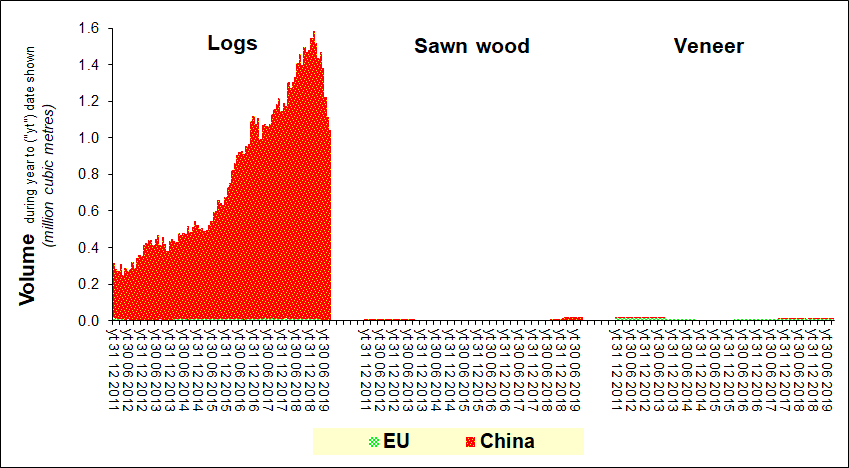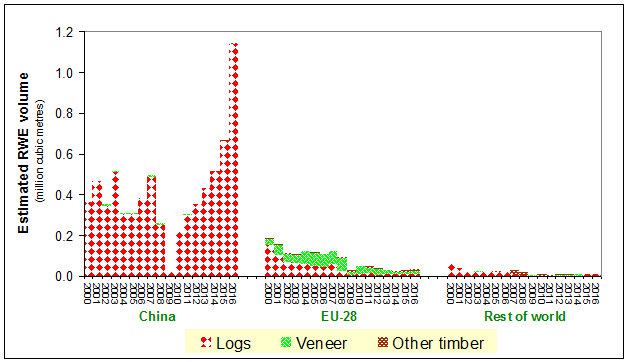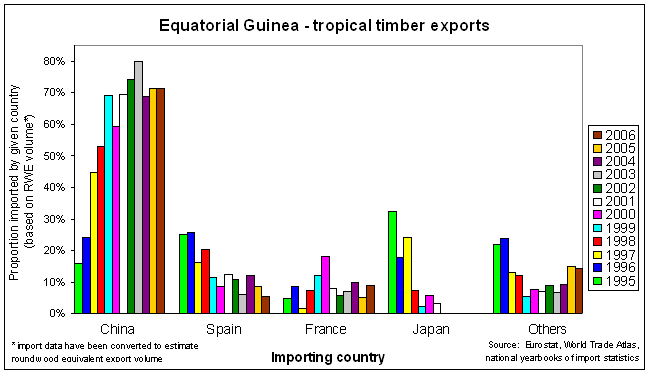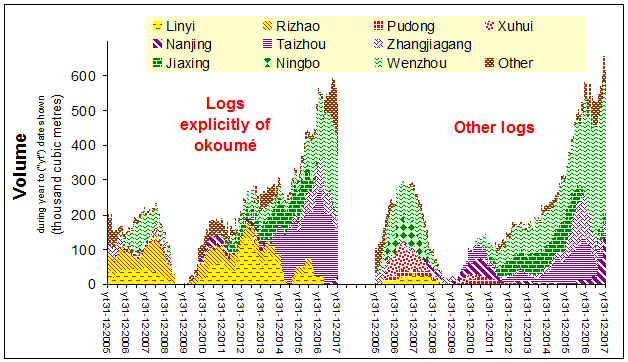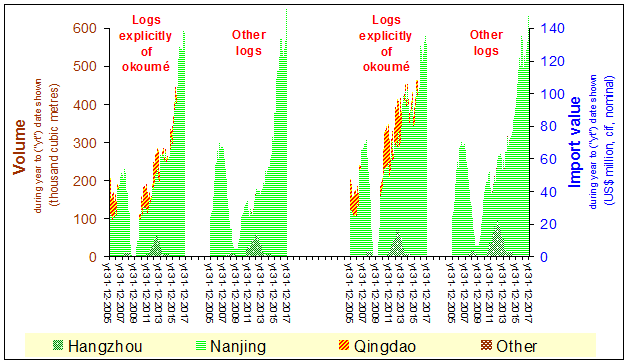|
|
||||||||||||||||||||||||||||||||||||||||||||||||||||||||||||||||||||||||||||||||||||||||||||||||||||||||||||||||||||||||||||||||||||||||||||||||||||||||||||||||||||||||||||||||||||||||
|
|
||||||||||||||||||||||||||||||||||||||||||||||||||||||||||||||||||||||||||||||||||||||||||||||||||||||||||||||||||||||||||||||||||||||||||||||||||||||||||||||||||||||||||||||||||||||||
|
Equatorial Guinea
|
||||||||||||||||||||||||||||||||||||||||||||||||||||||||||||||||||||||||||||||||||||||||||||||||||||||||||||||||||||||||||||||||||||||||||||||||||||||||||||||||||||||||||||||||||||||||
|
China
and the EU's imports of timber from Equatorial Guinea Importing
countries' imports of timber from Equatorial Guinea China's
imports of logs Equatorial Guinea - by
"location of importer"
China's
imports of logs Equatorial Guinea - by
"customs district"
Imports
of logs from Equatorial Guinea declared by China
Source: China Customs 0 0 27 |
||||||||||||||||||||||||||||||||||||||||||||||||||||||||||||||||||||||||||||||||||||||||||||||||||||||||||||||||||||||||||||||||||||||||||||||||||||||||||||||||||||||||||||||||||||||||
|
Shimmer, an affiliate of Malaysian conglomerate Rimbunan Hijau[p3][-][-] (whose logging interests in several tropical countries are notorious[-] [-]), is said to have recommenced logging operations in Equatorial Guinea during 2009[p177]. Allegations[clauses 59 and 60] of illegality by Shimmer prior to the ban (in association with the Minister of Forestry and Agriculture) are damning. So much so that it would be reasonable for anyone carrying out due diligence on products made wholly or partly from logs supplied by any affiliate of that conglomerate - irrespective of the country of origin of those logs - to regard such timber as sufficiently likely to be associated with illegality to warrant the prospective buyer deciding not to proceed - assuming of course that the products are to be placed on the market in any one of the increasing number of countries which prohibit the placing of illegal wood-based products on the market. In most such countries, the prospective placer is obliged to exercise sufficient due diligence to exclude such products. One might expect this to pose problems for those who manufacture products made in China from tropical timber given that that conglomerate is one of China's leading suppliers of tropical logs (particularly of okoumé). However, implying lax implementation or lack of political will (perhaps linked to lobbying), the USA's imports of such products seems to have increased since the amended Lacey Act became effective. Clauses 42-69 of a recent court document[-] provide detailed allegations that Equatorial Guinea's Minister for Forests and Agriculture extorted payments from timber/logging companies, some of which were then given his protection in carrying out illegal logging operations. Equatorial Guinea (formerly a Spanish colony) is one of Africa's newly oil-rich dictatorships. Its offshore oilfields are dominated by the USA. China has been able to gain lead position concerning the country's unexploited oilfields on mainland Rio Muni without attracting US attention through its forest-related and construction activities in that province. Those construction activities include road improvements - to facilitate / subsidise timber exports to China. Rio Muni's forest is rich in Okoumé. Logs should by law account for a minority of the country's timber exports. However, since the mid-1990s - when China became actively interested in Equatorial Guinea's forests, logs have accounted for the great majority of those exports. On average, China has accounted for two thirds of the country's timber exports during the last few years. China's purchases have caused the legal limit for national log production, 450,000m3/year, to have been exceeded by as much as 50% in some recent years. China has offered no compensation for this clearly unsustainable and illegal trade. Since the mid-1990s and until the log export ban of 2008, the logging sector was dominated by what has become a multi-national conglomerate (via Shimmer and in turn Mafrica) which at that time was probably China's leading supplier of tropical (and, to a lesser extent Russian) logs. That conglomerate had access to a dozen or more concessions totalling in excess of 300,000ha in Equatorial Guinea (almost 20% of the 1.7mi ha available; the company claimed that it owned 400,000ha). It acted as subcontractor to designated concessionaires (who appear to include the family of the country's President) - avoiding direct responsibility for preparing and adhering to credible forest management plans, and gaining immunity from effective prosecution. It accounted for over half the country's log production and was therefore logging at rate roughly five times greater than the average for the country's other logging companies. It accounted for roughly 70% of the country's annual production limit and almost all its exports comprised logs. This indicates that the conglomerate's timber exports (and China's imports) from Equatorial Guinea should have then been (and probably should also now be) deemed illegal - as it would seem[-] should be its supplies from other countries. The conglomerate is understood to have threatened to stop logging if the government of Equatorial Guinea refused to permit it to cut trees of diameter less than the current legal minimum (60cm). This tends to confirm that at least one concessionaire was logging at rates substantially in excess of the maximum for sustainable forest management. The EU-funded CUREF project (now complete) provided an excellent basis for sound management of Equatorial Guinea's forests. INDEFOR, which has legal jurisdiction over national parks and logging concessions, has received no operating budget for some years - despite oil-rich Equatorial Guinea having one of the highest GDP/person ratios in Africa. INDEFOR is therefore largely unable to take forward the work of CUREF. Prior to the ban, so exhausted were Equatorial Guinea's forests that export-oriented logging increasingly threatened a number of protected areas (notably the Monte Alén - Monte Mitra region - an important biodiversity hotspot). Equatorial Guinea tends to be ignored by trade organisations despite it epitomising much of what is rotten in tropical timber production - and what, by extension, is holding back the tropical timber industry from realising its full potential. It is not a member of the ITTO but is a Party to CITES. Given the power of Rimbunan Hijau and the failure of the government to manage its forest sustainably - perhaps the only way to protect the country's forest is a CITES Appendix II listing for Aucoumea klaineana (Okoumé). Such a listing would restrict the supply of products made at least partly from this species by importing countries' (including China) to a level which will not be detrimental to the role of this species in its ecosystem.
Other related reading: "Second Amended Verified Complaint for Forfeiture In Rem" US District Court for the Central District of California (06 2012)"The Forests of Equatorial Guinea in 2008" Observatoire des Forêts d'Afrique Centrale "Bilan Économique 2002" Ministère de la Planification et du Développement Économique Republique de Guinée Équatoriale "Paysage Monte Alén-Monts de Cristal (Etat des Forêts 2006)" CARPE "USDA-Forest Service Technical Assistance Trip: In Support to USAID Central African Regional Program for the Environment" John E Palmer "Conservation de la Biodiversité Forestière en Afrique Centrale Atlantique: le Réseau d'Aires Protégées - Est-il Adéquat?" Bois et Forêts des Tropiques, 2001 No 268 "Equatorial Guinea" OECD "Republic of Equatorial Guinea: Selected Issues and Statistical Appendix" IMF 2006 "El Estudio de Perspectivas del Sector Forestal en África - La República Guinea Ecuatorial" FOSA 2001 |
||||||||||||||||||||||||||||||||||||||||||||||||||||||||||||||||||||||||||||||||||||||||||||||||||||||||||||||||||||||||||||||||||||||||||||||||||||||||||||||||||||||||||||||||||||||||
|
Copyright
globaltimber.org.uk
|
||||||||||||||||||||||||||||||||||||||||||||||||||||||||||||||||||||||||||||||||||||||||||||||||||||||||||||||||||||||||||||||||||||||||||||||||||||||||||||||||||||||||||||||||||||||||

